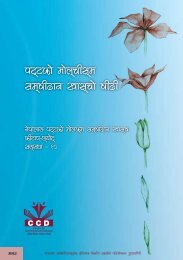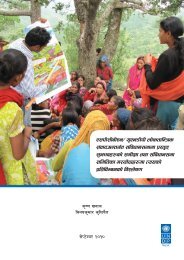The Dalits of Nepal and a New Constitution - ConstitutionNet
The Dalits of Nepal and a New Constitution - ConstitutionNet
The Dalits of Nepal and a New Constitution - ConstitutionNet
You also want an ePaper? Increase the reach of your titles
YUMPU automatically turns print PDFs into web optimized ePapers that Google loves.
<strong>The</strong> <strong>Dalits</strong> <strong>of</strong> <strong>Nepal</strong> <strong>and</strong><br />
a <strong>New</strong> <strong>Constitution</strong><br />
39<br />
that the Government is expected to turn a magic tap<br />
<strong>and</strong> make water flow into every home. <strong>The</strong> International<br />
Covenant includes some important ideas that can be also<br />
introduced into the <strong>Constitution</strong>. <strong>The</strong>se include nondiscrimination<br />
(everyone must have equal access to the<br />
rights), <strong>and</strong> progressive realisation – that is that the state<br />
(the government) has the duty to move towards full<br />
realisation <strong>of</strong> the right. And there is also the idea that<br />
the government must use the resources that it has to<br />
realise those rights. It is not expected suddenly to<br />
become rich enough to work miracles. <strong>The</strong> <strong>Constitution</strong><br />
could include the requirement that the state should give<br />
priority to those whose need is greatest. In interpreting<br />
the Covenant other important ideas have been<br />
developed. Especially there is the idea that the most<br />
basic duty <strong>of</strong> the state is to respect the rights: this means<br />
that the state must not itself interfere with the right to<br />
access to water. Secondly the state must protect that<br />
right from interference by others – this would include<br />
the duty to protect water supplies from pollution, <strong>and</strong><br />
over-use. <strong>The</strong>re is a duty actively to fulfil the right only if<br />
people cannot do it for themselves <strong>and</strong> if measures <strong>of</strong><br />
protection do not achieve the right. So the emphasis is<br />
on people being free to satisfy their needs themselves,<br />
with the duty <strong>of</strong> the state being to support the people<br />
in that. All this could be concisely written into the<br />
<strong>Constitution</strong>.<br />
Education<br />
Education is another right under the Covenant. In fact there<br />
is a duty to ensure primary education immediately – not<br />
progressively. It would be possible to go further <strong>and</strong> say<br />
that the right to education includes the right that there<br />
are teachers from all communities. And the right could<br />
also include a right to a syllabus <strong>and</strong> to school books that<br />
do not portray particular groups in a derogatory light.<br />
Chance to work<br />
<strong>The</strong> same Covenant includes the right to work <strong>and</strong> to<br />
decent conditions <strong>of</strong> work. Many constitutions have<br />
included rights <strong>of</strong> this sort. <strong>The</strong> same principles apply:<br />
that the state must try to achieve the fulfilment <strong>of</strong> these<br />
rights – not by giving everyone jobs but by not st<strong>and</strong>ing<br />
in the way <strong>of</strong> people working, by reasonably protecting<br />
working rights – though positive steps to make work<br />
possible might also be an obligation in some circumstances.<br />
An end to violence against Dalit women<br />
This is a difficult topic. Anyone can see that a statement<br />
in a <strong>Constitution</strong> that “<strong>The</strong>re must be no violence<br />
against women” will probably achieve nothing. Violence<br />
against anyone is already a criminal <strong>of</strong>fence. <strong>The</strong><br />
reasons why violence against women is such a problem<br />
in many countries are complex, being concerned with<br />
culture, economic status, social attitudes including those<br />
<strong>of</strong> law enforcement agencies <strong>and</strong> other factors. <strong>The</strong> fact<br />
that it is complex does not mean it is not a suitable<br />
subject for discussion at the Constituent Assembly. <strong>The</strong><br />
message at this point must be: Get the topic on the<br />
agenda <strong>of</strong> the Constituent Assembly. Do not accept<br />
arguments that this is nothing to do with a <strong>Constitution</strong>.<br />
Insist that it is a topic worthy <strong>of</strong> discussion <strong>and</strong> that there<br />
may be things that even a <strong>Constitution</strong> can say that are<br />
relevant to the issue.<br />
Access to l<strong>and</strong> for the l<strong>and</strong>less<br />
This is another very complex issue <strong>and</strong> one that a<br />
<strong>Constitution</strong> cannot produce any magic solution to. But<br />
again this is something that it is entirely appropriate to<br />
discuss in a Constituent Assembly. <strong>The</strong> <strong>Constitution</strong> may<br />
be able to remove some obstacles to l<strong>and</strong> reform: for<br />
example in some countries property rights have stood<br />
in the way <strong>of</strong> efforts to get l<strong>and</strong> for the l<strong>and</strong>less.<br />
Discussions on such a right must take this into account.<br />
Maybe there is something about governance that creates<br />
problems over l<strong>and</strong> allocation. And if there is a federal<br />
system, the effectiveness <strong>of</strong> policies on l<strong>and</strong> may depend<br />
on which level <strong>of</strong> government has the power to make<br />
decisions on this topic, <strong>and</strong> where the control <strong>of</strong> resources<br />
lies. <strong>The</strong> important thing again is to get the issue onto<br />
the agenda <strong>of</strong> the Constituent Assembly, <strong>and</strong> insist that<br />
it receives full consideration.<br />
Express recognition <strong>of</strong> Dalit rights<br />
<strong>Dalits</strong> face psychological obstacles that communities<br />
in other countries face: that there is an expectation<br />
that <strong>Dalits</strong> will not be Chief Justice or Prime Minister<br />
or hold other public <strong>of</strong>fices. It is the sort <strong>of</strong> expectation<br />
that women face in many countries. In drafting their<br />
1996 <strong>Constitution</strong> the South African Constituent<br />
Assembly devised an interesting approach: as well as<br />
gender neutral language (not a big problem in <strong>Nepal</strong>i),<br />
they went to further to clarify that when they said


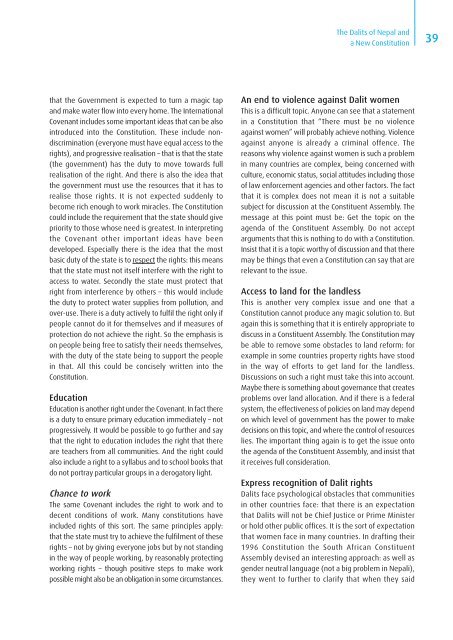

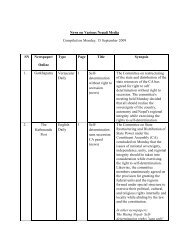

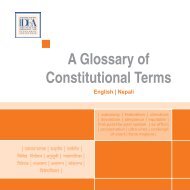
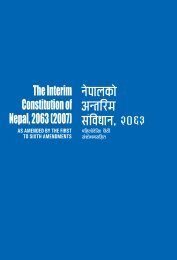
![g]k fnsf blntx? / gofF ;+l jwfg](https://img.yumpu.com/49483602/1/184x260/gk-fnsf-blntx-goff-l-jwfg.jpg?quality=85)
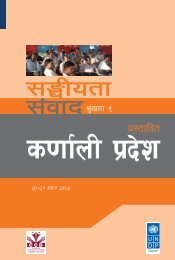
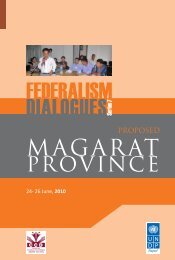
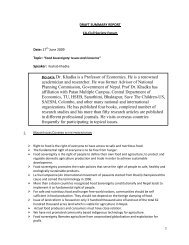
![+ljwfg;ef, /fHosf]k'g](https://img.yumpu.com/41604075/1/184x260/-ljwfgef-fhosfkg.jpg?quality=85)
